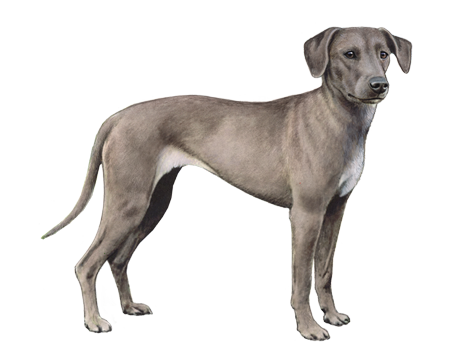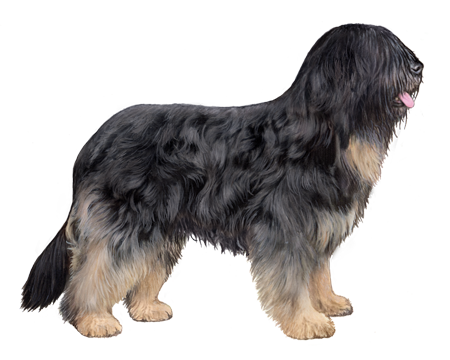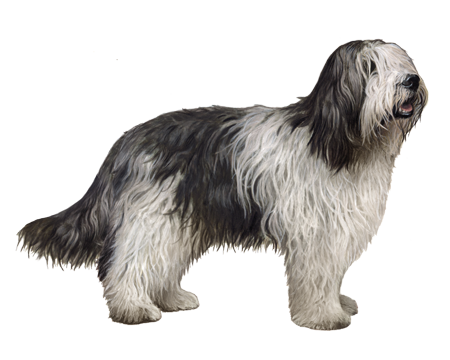
American Indian Dog
The American Indian Dog is a rare breed that captures the versatility and spirit of early Native American and First Nations dogs. These pups excel at a variety of duties and activities—including search and rescue, service, livestock guarding, and herding. They also make nurturing and devoted family companions.
Interested in discovering if your dog is an American Indian Dog?
Check out Wisdom Panel's DNA tests.

American Indian Dog Traits
General Appearance
The American Indian Dog is medium-sized with a light build and dingo-like appearance.
Coat and Coloring
The coat of the American Indian Dog consists of a short, thick undercoat and longer guard hairs that stand off from the body. The breed's hair is longest on the chest, ruff, shoulders, back of legs, and tail. These dogs come in various colors—including black, blue, white, gray, fawn, and silver. All coat colors have sable shading with darker tipped guard hairs.
Distinctive Physical Traits
American Indian Dogs have wedge-shaped, moderately long muzzles, longish pricked ears, and almond-shaped eyes that come in pale yellow or pale blue. They also have long, bushy tails that they carry down with a slight curve.
American Indian Dog Temperament
These intelligent working dogs and loyal companions have a strong pack instinct and bond closely with their people. That said, they tend to be reserved with strangers. Their alert personalities and nurturing instincts make them excellent family watch dogs.


American Indian Dog History
In the 1960s, Kim La Flamme set out to preserve the indigenous dogs of the North American Indian tribes. These dogs were specifically bred to be excellent babysitters, but they also worked as hunters and herders through the 1700s. Unfortunately, their population all but vanished after the arrival of Europeans in the early 1800s.
La Flamme traveled to Indian reservations from Canada to Mexico, searching for dogs that most closely approximated the old native dogs. Slowly but surely—and with the help and history of Tribal Elders—he found several dogs that served as the foundation stock for the American Indian Dog breeding program. Though these dogs look and behave just like the traditional native dogs of yore, La Flamme points out it's impossible to prove that they directly descend from pure Native American dogs.
In 2001, La Flamme authorized the formation of the International Indian Dog Owners and Breeders Association. This group of owners and breeders is dedicated to maintaining the breed's appearance, primitive instincts, and temperament.
American Indian Dog Care
Nutrition
American Indian Dogs thrive on a high-quality diet formulated for their life stage (e.g., puppy, adult, senior). Staying at a healthy weight is important for their long-term health. To prevent obesity, carefully monitor your dog's food intake—including treats. As a guideline, they should make up no more than 10% of a pup's daily calories.
Grooming
This breed has relatively modest grooming needs. Weekly brushing and the occasional bath will keep your dog looking their best. Regular nail trims should also be part of their monthly routine, as nails that get too long can cause pain and potentially lead to problems running or walking.
Good dental hygiene is essential to every dog's overall health. Dental disease is one of the most common conditions in adult dogs. Left untreated, it can contribute to other serious health issues. So, in addition to professional cleanings, establish an at-home dental care program that includes regular teeth brushing and veterinarian-recommended dental chews.
Exercise
American Indian Dogs are active pups and need daily outlets for their energy. They love outdoor activities—such as long walks and hikes with their humans. They're also well-suited for agility, rally, herding, and other dog sports that challenge their minds as well as their bodies.
Training
These intelligent dogs are eager to learn, and they respond best to calm, respectful, assertive training techniques. Along with basic obedience training, early socialization can help your American Indian Dog develop into a predictable, well-mannered adult dog.

Breed Group
Herding
The herding group is a diverse category. These highly intelligent breeds were developed to guard and control the movement of livestock.
Resources
http://www.indiandogs.com/timeline.html
http://iidoba.org/standards.htm
Reviewed June 16, 2021 by Jamie Freyer, DVM


































































